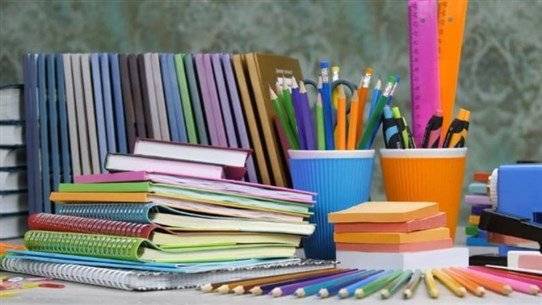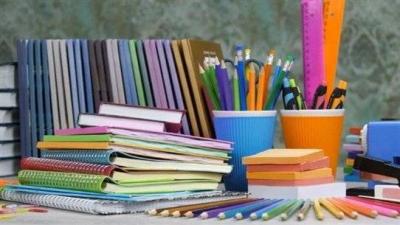Publishers and private libraries have prepared themselves for the school book sales season "without knowing if we will sell or not," says a print shop and library director. The educational scene, just days before schools reopen, appears "hazy". In addition to the overall deterioration of the situation in the country, some schools struggle to issue book lists due to uncertainty about parents' ability to pay. Many have not yet decided on their children's school because a series of questions is swirling in their minds: Can we afford tuition, book costs, stationery, and school uniforms? What will the cost of the school bus be, especially with the fuel prices? Is there a school that costs less and offers a good education? Will there be formal education available?
The director considered a solution that "satisfies all parties": splitting the list of books into two parts, suggesting that those who cannot pay in one go buy only the first semester's books and leave the rest until mid-year. Some schools welcomed the idea and promised to present it to the parents' committees. Last year, students exchanged books with the support of schools, which "led to a 94% decrease in new book sales," according to Jadd Aasi, General Director of the Lebanese Dar al-Fikr. When the Ministry of Economy set the price of books at that time based on 45% of their actual price, "we took a hit."
This year, an agreement was reached between the School Publishers Association and the Ministry of Economy to charge 76% of the book's actual price. This means that "the ones who will suffer" are the parents. The cost of book bundles for primary school students has reached about $70 if they strictly contain Lebanese program books, and it goes up to $200 if they include foreign books, while the price list for middle school students is around $100 and $150 for high school students. However, publishers complain about the erosion of their profits after deducting 24% from the book price, in addition to giving up 20% for libraries, which means they are relinquishing 44% of their profit margin. They discuss high costs, including paper prices (which have increased by 220% in the last two years), printing, author and illustrator rights... However, the biggest loss, according to Aasi, is not financial but educational, represented by the inability to renew and develop curricula. "We no longer dare to ask authors to write a new set of books, which kills creativity and development, leading to dire consequences in the long term."
It’s noteworthy that book prices are set in U.S. dollars and affected by the black market exchange rate. Does this mean that its "daily jumps" will constantly change book prices? Aasi replies: "No, prices only change if the dollar increases or decreases by 10%." But even this percentage is not long-lasting and can easily be achieved within days. This situation "ties the hands" of some schools and hinders their task of preparing book lists, as is the case for many Catholic schools that "demand a fixed exchange rate for the school book dollar so that parents know the costs they will incur," says its Secretary-General, Youssef Nasr, noting that "preparing lists is easy for some schools and difficult for others depending on the economic and social environment and the parents' ability to bear the costs."
It has not been difficult for Al-Mustafa schools to set book lists for all educational stages since last year. They decided to "keep books as they are and only change editions in cases of necessity, such as book shortages, adopting national books that maintain the educational level we want at reasonable prices, prioritizing cost-saving when two books compete, and endorsing book exchanges among students," according to their General Director, Mohammed Samaha.
On the other hand, there are schools that were dissatisfied with the role they played as "sympathetic" towards parents during the past two years. For them, the crisis series has ended. They candidly tell parents: We do not accept used books; we want foreign books that cost about three times as much as national books. We will change editions without making any significant changes to the content so you won't be able to buy them used... They have also reopened various profit channels. They imposed on parents the purchase of stationery at inflated prices under the pretext of unifying the logo, in addition to a school uniform that reached $175 because it consists of seven pieces!
All of this occurs without intervention from the Ministry of Education and Higher Education, which has not considered supporting national books at least. When parents found themselves left alone and unable to bear these financial burdens, they searched private libraries for used books, which Nida, manager of the Al-Saha library in Burj al-Barajneh, describes as a "frenzy" to buy. However, for new books, "we request them from publishers piece by piece after the customer pays a deposit." Traditionally, used books are sold for half their new price, but that will be "heavy" on parents given the "shocking" prices that can reach a million lira.
Interestingly, how do national books survive for the third school year? Since the start of the economic crisis two years ago and the halt of new editions while turning to used books, books circulate among students, are erased, then reused until they deteriorate, especially since "national books do not last more than two years unlike foreign ones which last about four years due to their thick covers and sturdy binding," Aasi confirms. It seems that parents are begging to revive the dead when searching for used books in good condition. "They are not envied for this condition," is how Lama Al-Tawil, president of the Union of Parents' Committees and Guardians in private schools, summarizes the "pressures weighing down parents to secure their children's educational expenses which go beyond books and stationery to include tuition, insurance fees, uniforms, and transportation."
Some parents individually resort to photocopying expensive textbooks, saving about half the price. Sometimes, this happens in an organized manner in schools preparing booklets from one or more books. This behavior is "against the Law of Protection of Literary and Artistic Property No. 75/99, which safeguards and protects any intellectual property, whether written, visual, sculptural, calligraphic, or oral," according to lawyer Sharif Suleiman. The law allows for recourse to the competent judiciary to issue a decision to stop violations of authors' rights and stipulates that "the violator pays just compensation for damages, both material and moral, to the rights holder, assessed by the courts based on the commercial value of the work and the damage caused." Violations may be punishable by imprisonment from one month to three years and fines ranging from five million to fifty million Lebanese lira, or one of these penalties. But wait, "before which court can the aggrieved party file a complaint?" Suleiman laments, regretting the country that "has paralyzed all its joints." He understands the parents who "have closed all avenues of recourse and have sought any way to save, having found no judiciary to refer to when they were imposed exorbitant and inflated tuition fees."
Austerity in purchasing school supplies has been going on for two years, and with each year it becomes harsher. This year, the dollar exchange rate exceeded 35,000 lira without any wage adjustments accompanying it. Many have deprived themselves of renewing school bags, which now exceed a million lira. Purchasing stationery in installments has become the norm with each visit to the bookstore. Some have even abandoned stocking up on stationery that would last the entire year because its total bill for one student ranges from 1.5 million lira to two million lira.
A tour of the bookstores reveals "shocking" prices for stationery. For example: the price of a small notebook (50 pages) is 17,000 lira, a large one 85,000 lira, a pen 5,000 lira, an eraser 11,000 lira, while a sharpener costs 19,000. For art supplies, the medium-sized drawing book costs 147,000 lira, and a box of colored pencils (12 colors) is 65,000 lira. The calculator costs $17... You leave the bookstore with a headache and wonder about denying children the joy of choosing stationery that increases the excitement of going back to school. Moreover, there are students who will carry, for the first time, used books that may be worn out and torn, and others that are photocopied and lack colors, and they will compare them with their classmates' supplies.
Social sciences teacher and psychotherapist Maysoun Hamzeh does not find that depriving children and the class disparity is something new confined to schools; "it has been happening for a long time and everywhere, but its scope has expanded with the economic crisis." She advises parents "to communicate with their children and honestly share the financial hardship and difficult situations they are going through that force them to practice austerity." According to Hamzeh, "they should also provide answers to all their questions in this regard to alleviate feelings of anxiety, deprivation, and inferiority," while assuring them that it is "a temporary time period that will end."




